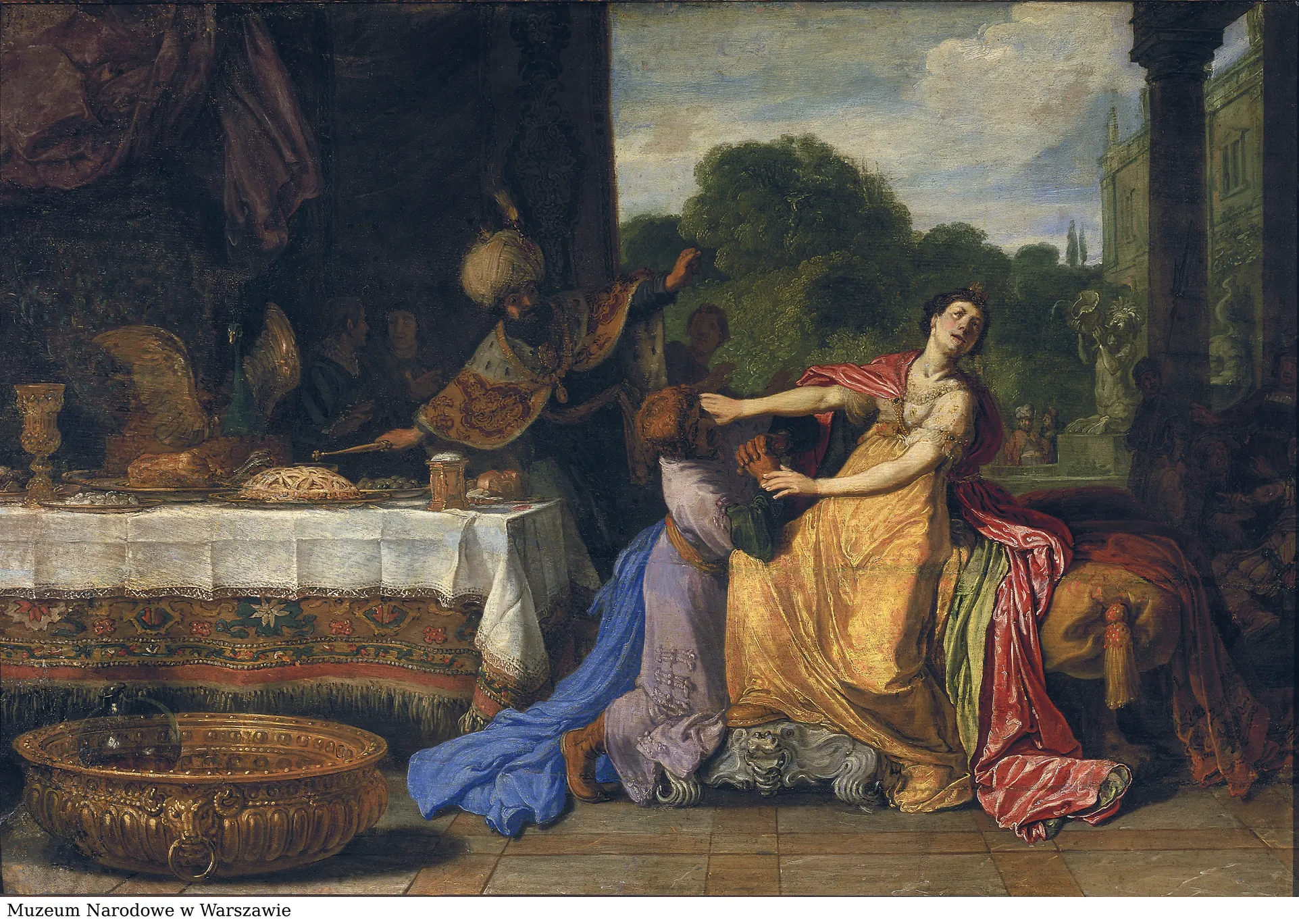The story of Mephibosheth is one of redemption, grace, and loyalty that is intertwined with the lineage of King David in the Old Testament. Who was he, and what did he have to do with the covenant between David and Jonathan? How did he receive restoration and redemption? In this post, we will dive into the captivating tale of Mephibosheth and explore the enduring lessons it holds.
Who was Mephibosheth?
Mephibosheth is a character mentioned in the Old Testament of the Bible. He was the grandson of King Saul and the son of Prince Jonathan. Mephibosheth was crippled as a child, making him unable to walk.

The lineage of Mephibosheth can be traced back to the first king of Israel, Saul. After the death of King Saul and Prince Jonathan, David became the king of Israel. During his reign, David made a covenant with Jonathan, promising to show loyalty and kindness to his descendants.
One day, while seeking to fulfill his covenant with Jonathan, David asked if there were any of Jonathan’s descendants still alive. David was then told about Mephibosheth, who was living in a town called Lodebar, under the care of a man named Ziba.

When David met Mephibosheth, he showed him kindness and favor, restoring to him all that belonged to his grandfather Saul. David welcomed Mephibosheth to live in Jerusalem and dine with him at the royal table every day.
Mephibosheth was shocked by David’s kindness and grace, feeling unworthy to be treated with such honor. He considered himself a dead dog and saw David as his redeemer. David’s actions proved his faithfulness to the covenant he made with Jonathan, giving Mephibosheth a second chance at life.
Throughout the story of Mephibosheth, we see the themes of redemption, faithfulness, and provision. Mephibosheth was given a new life, not because of anything he did but because of David’s love and loyalty to Jonathan. This story encourages us to trust in God’s grace and mercy, even when we feel undeserving.
The legacy of Mephibosheth is one of honor and kindness. By showing grace to a crippled man whom the world had cast aside, David demonstrated that true strength is in humility, compassion, and loyalty. May we all strive to follow in his footsteps and show grace to those in need around us.
In summary, Mephibosheth was a Bible character known for his redemption and grace. He was the grandson of King Saul and the son of Prince Jonathan. Through his story, we see David’s faithfulness to the covenant he made with Jonathan, and the provision of God in our lives. In the next section, we will delve deeper into the story of Mephibosheth and the grace he received from David.
- Mephibosheth is a character mentioned in the Old Testament of the Bible, who was the grandson of King Saul and the son of Prince Jonathan.
- David made a covenant with Jonathan, promising to show loyalty and kindness to his descendants.
- When David met Mephibosheth, he showed him kindness and favor, restoring to him all that belonged to his grandfather Saul.
- The story of Mephibosheth is about redemption, faithfulness, and provision.
- The legacy of Mephibosheth is one of honor and kindness.
Mephibosheth and the story of grace
Mephibosheth was a Bible character found in the Old Testament. He was the son of Jonathan, the grandson of Saul, and a member of the royal family of Israel. However, his life was marked by adversity, as he became crippled following a traumatic incident where his nurse dropped him while fleeing from danger.
Despite his unfortunate circumstances, Mephibosheth remained loyal to his family and inherited the family’s land in the region of Gilead. However, when David became king of Israel, Mephibosheth’s fate took a significant turn.
David had a covenant with Jonathan, Mephibosheth’s father, which called for him to show kindness to Jonathan’s offspring. As a result, David sought out any remaining descendants of Jonathan to extend grace and mercy to them. When he heard about Mephibosheth’s existence, David summoned him to come to Jerusalem.
To Mephibosheth’s surprise, instead of punishing or harming him, David restored his land and provided him with a place at the king’s table. This act of redemption and kindness was a powerful display of God’s grace in action, and it was a significant moment in Mephibosheth’s life.

Mephibosheth had lived in isolation and shame due to his disability and the tragic events surrounding his family’s history. However, David’s act of kindness and favor towards him restored his dignity and place in society. Mephibosheth was now living in the royal palace, sharing meals with the king himself, and enjoying a new and better life than he ever could have imagined.
This story showcases God’s provision, mercy, and faithfulness towards His people, even in the most difficult circumstances. Mephibosheth’s restoration proved that God’s grace is available to everyone, regardless of their past mistakes, shortcomings, or disabilities. It is a reminder that God loves us, not because of what we have done or what we can do, but simply because we are His children.
Mephibosheth’s story is a powerful testimony to the transformative nature of grace and the impact that redemption can have on an individual’s life. His legacy is one of honor and faithfulness, and his story serves as an inspiration for all who seek restoration and hope in their lives.
The lineage of Mephibosheth
Mephibosheth’s lineage is an integral part of his story. In the Old Testament of the Bible, we learn that Mephibosheth was the grandson of King Saul and the son of Jonathan, making him royalty in the eyes of Israel.
However, Mephibosheth’s life took a tragic turn when he was just five years old. During a battle, both his father and grandfather were killed, and in the chaos that followed, Mephibosheth was dropped, resulting in injuries that left him crippled for life.
After this tragedy, Mephibosheth’s life became one of exile and fear. He was forced to flee with his nurse to Gibeon, where he lived a quiet life, far from the royal courts of Jerusalem.
It wasn’t until years later that Mephibosheth’s life would change again when David became king of Israel. David had a deep friendship with Jonathan, Mephibosheth’s father, and after he learned of Mephibosheth’s whereabouts, he sought to restore him to his rightful place in the kingdom.
Through David’s covenant with Jonathan, Mephibosheth was given a place of honor and provision in the royal court. Despite his physical limitations, Mephibosheth was given a new life filled with favor and grace.
The lineage of Mephibosheth is a testament to the faithfulness and loyalty of God. Despite the tragic events that led to his exile and crippled condition, God’s restoration and redemption of Mephibosheth’s life serves as a powerful reminder of the power of love and mercy.
In summary, the lineage of Mephibosheth is a crucial part of his story. It not only highlights his royal status but also sets the stage for the incredible grace and redemption that he experienced later in life.
The covenant between David and Jonathan

Have you ever heard of the covenant between David and Jonathan in the Old Testament? This covenant would serve as the foundation for the story of Mephibosheth, a Bible character whose tale is one of redemption and grace.
Jonathan was the son of King Saul and a close friend of David’s. Despite their fathers’ animosity towards each other, Jonathan and David made a covenant of friendship and loyalty. This covenant was made in the presence of God and signified their commitment to one another above their own families.
This commitment was seen in the way Jonathan protected David from his father Saul’s wrath and how David upheld Jonathan’s honor and lineage even after Jonathan’s death. In fact, when David became king of Israel, he searched for anyone left in Jonathan’s family to show kindness to for Jonathan’s sake. That is when he found Mephibosheth, Jonathan’s crippled grandson.
As a result of the covenant made between Jonathan and David, David showed grace and mercy towards Mephibosheth. Instead of punishing him for being a part of Saul’s family, David restored to Mephibosheth all that belonged to Saul. David even granted Mephibosheth a permanent place at his table, treating him like his own son.
The covenant between David and Jonathan serves as a reminder to Christians of the importance of loyalty, faithfulness, and favor. We too have made a covenant with God through Jesus Christ, and we ought to be steadfast in our commitment to Him above all else. Like David, we should show kindness and mercy to those in need, especially those who are a part of our spiritual family.

The story of Mephibosheth is not only a tale of restoration and redemption but also of God’s provision and kindness towards those who have been faithful to Him. Mephibosheth’s legacy serves as a reminder of the importance of ancestry and family, and how even in the midst of brokenness, God can bring about beauty and honor for His glory.
Mephibosheth and Ziba’s loyalty
The story of Mephibosheth is not only a tale of grace and redemption, but it is also a story of loyalty and faithfulness. Mephibosheth was the grandson of King Saul and the son of Saul’s son Jonathan. After Saul and Jonathan’s death, David, who was Jonathan’s closest friend, became the king of Israel. David’s love for Jonathan led him to search for any remaining member of Jonathan’s family to show them kindness and grace.
David found Mephibosheth who was crippled and living in the land of the Gibeonites. Despite Mephibosheth’s physical disability, David showed him kindness and restored to him everything that was once Saul’s. As a result, Mephibosheth became a regular guest at the king’s table and was given the land that once belonged to his grandfather Saul.
In the story, we learn about the loyalty of Ziba, Saul’s servant. When David gave all of Saul’s property to Mephibosheth, he also gave Ziba the responsibility of taking care of it. However, the story took an unexpected turn when David decided to give half of the property to Ziba as well, under the assumption that Mephibosheth was disloyal.

But as it turned out, Ziba was deceitful and had lied to David about Mephibosheth. Though Mephibosheth was portrayed as disloyal, it was Ziba who misinformed David. When David discovered the truth, he saw that Mephibosheth had remained loyal to him and his throne.
This story teaches us that loyalty and faithfulness are important qualities to possess. It also serves as a reminder that we should always seek out the truth before making any rushed decisions. In this particular case, David almost made a grave mistake by giving away half of Saul’s belongings to someone who didn’t deserve it, but because he was able to uncover the truth, he quickly changed his mind and restored everything to Mephibosheth.
Overall, the story of Mephibosheth and Ziba’s loyalty is an important lesson for all Christians. It reminds us of God’s grace and kindness towards us, and how we should strive to show that same level of kindness, loyalty, and faithfulness to others.
Restoration and redemption of Mephibosheth
Mephibosheth, the grandson of King Saul, was a crippled man who was living in the land of the Gibeonites when David became king of Israel. One day, David remembered his covenant with Jonathan and asked if there was anyone left from Saul’s household that he could show kindness to. Ziba, a servant, informed David of Mephibosheth’s whereabouts, and David sent for him.
When Mephibosheth arrived, he fell at David’s feet and expected the worst. Instead, David told him that he would restore to him all the land that belonged to his grandfather Saul and that he would always eat at David’s table. This was a significant act of grace and mercy, as crippled people were often seen as burdens and outcasts in ancient cultures.

Mephibosheth was so overwhelmed by David’s kindness that he expressed his unworthiness and called himself a “dead dog.” But David did not see him that way, and Mephibosheth was given a place of honor at the king’s table.
Mephibosheth’s restoration was not just physical but also social and emotional. He was given a new home, a new community, and a new identity. The kindness and favor shown to him by David were not based on his own merit or accomplishments, but on the covenant that David had made with Jonathan. This is a picture of the grace and faithfulness of God, who shows favor to us, not because of anything we have done, but because of His love for us.
The story of Mephibosheth teaches us about redemption and restoration. Mephibosheth’s life was marked by tragedy and loss, but he was given a new lease on life because of the kindness of David. In the same way, God is able to restore us, no matter how broken or lost we may feel. We can find hope in the fact that our worth is not based on our abilities or achievements, but on the fact that we have been created in the image of God.
Furthermore, Mephibosheth’s restoration was not just for his own benefit but also for the benefit of others. When Ziba, his servant, came to David with news about Mephibosheth, he was loyal to his master and showed that he was invested in Mephibosheth’s future. We too can be instruments of God’s restoration by showing kindness, loyalty, and compassion to others.
The story of Mephibosheth reminds us that even in the midst of difficult circumstances, God is faithful to keep His promises and to show us His grace and mercy. We can trust that He will provide for us, protect us, and restore us, just as He did for Mephibosheth.
The legacy of Mephibosheth

Mephibosheth’s legacy is one of faithfulness, redemption, and favor. Although he was initially a forgotten man, he was eventually brought near to a king because of his ancestor’s loyalty. His story teaches us that no matter how much we may feel like an outcast, God’s grace is enough to bring us into favor.
Mephibosheth’s lineage has been traced back to Jonathan, the son of King Saul. King David and Jonathan forged a covenant of friendship that extended to their descendants. When Mephibosheth was young, he became crippled, and when his grandfather, King Saul, died, the people of Israel fled to Gibeon. It wasn’t until many years later that King David remembered Jonathan and sought out someone from his line to honor and bless.
The Bible story tells of David’s kindness towards Mephibosheth and his desire to restore his inheritance. Despite the potential threat that a descendant of Saul could pose to David’s kingship, David bestowed upon him a level of honor and provision that he deserved as the grandson of King Saul.
Through Mephibosheth’s story, we see the theme of redemption and restoration. Mephibosheth was once forgotten, rejected, and lost. But through the careful attention of King David, he was brought back to his rightful inheritance and given a place of honor in the king’s court.
Mephibosheth’s legacy is one of faithfulness to the covenant that his ancestor Jonathan made with David. Despite his own trials, Mephibosheth remained loyal to the house of David, showing that even in difficult circumstances, faithfulness can lead to great rewards.

As we read the story of Mephibosheth, we are reminded that God’s grace is enough to restore us to a place of honor. Like Mephibosheth, we may feel forgotten, rejected, or lost, but through faithfulness, loyalty, and redemption, we can find favor in the eyes of God. Mephibosheth’s legacy is one of hope, reminding us that God’s lovingkindness and provision are greater than any of our circumstances.
In summary, the legacy of Mephibosheth is one of faithfulness, redemption, and favor. His story teaches us that God’s grace is enough to restore us to a position of honor, and that faithfulness and loyalty can lead to great rewards.














